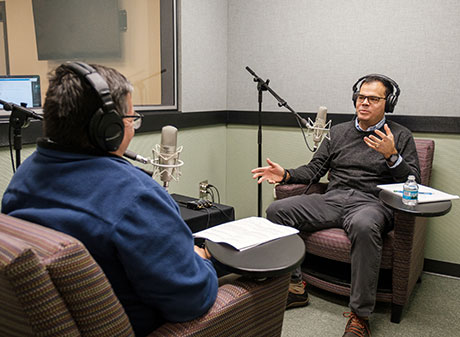Why Human Capital Matters

Greg Cancelada sits down with economist and research officer Alexander Monge-Naranjo
When hearing the word capital, many people think of only equipment like bulldozers and computers. But a growing area of economic research focuses on human capital—the knowledge and skills that workers use to produce goods and services.
In a recent Timely Topics podcast episode, Research Officer and Economist Alexander Monge-Naranjo discussed the elements of human capital and why the concept matters to the economy.
Going to the gym and learning new skills are examples of how to increase one’s potential capacity to produce goods and services, Monge-Naranjo offered.
“So essentially human capital is the aggregate of all those investments that we make on humans to increase their productive capacity,” he said.
Human capital can also be very specific knowledge of work at a particular job or even a particular location. For example, if a factory worker moves to a different location, the knowledge specific to the previous site is completely useless, Monge-Naranjo noted.
“And when it comes to measuring the human capital, sometimes you have to deal with the fact that there is … misalignment or mismatch—that some workers are qualified for doing some jobs but those skills are not really being used by the current job that they are doing,” he said.
Monge-Naranjo pointed out that if he were a great soccer player but instead remained an economist, he may not be using his skills.
So how does human capital translate into economic growth? The owners of technology are always looking for where they can get the best workers for the best value, Monge-Naranjo said.
“So I think human capital, especially now in a globalized economy, is becoming more and more important as a determinant of the income of a particular country,” he said.
Additional Resources
- Review: Should Capital Flow from Rich to Poor Countries?
- Regional Economist: Workers Abroad Are Catching Up to U.S. Skill Levels
- On the Economy: Overestimating the Loss of Human Capital
This blog offers commentary, analysis and data from our economists and experts. Views expressed are not necessarily those of the St. Louis Fed or Federal Reserve System.
Email Us
All other blog-related questions

